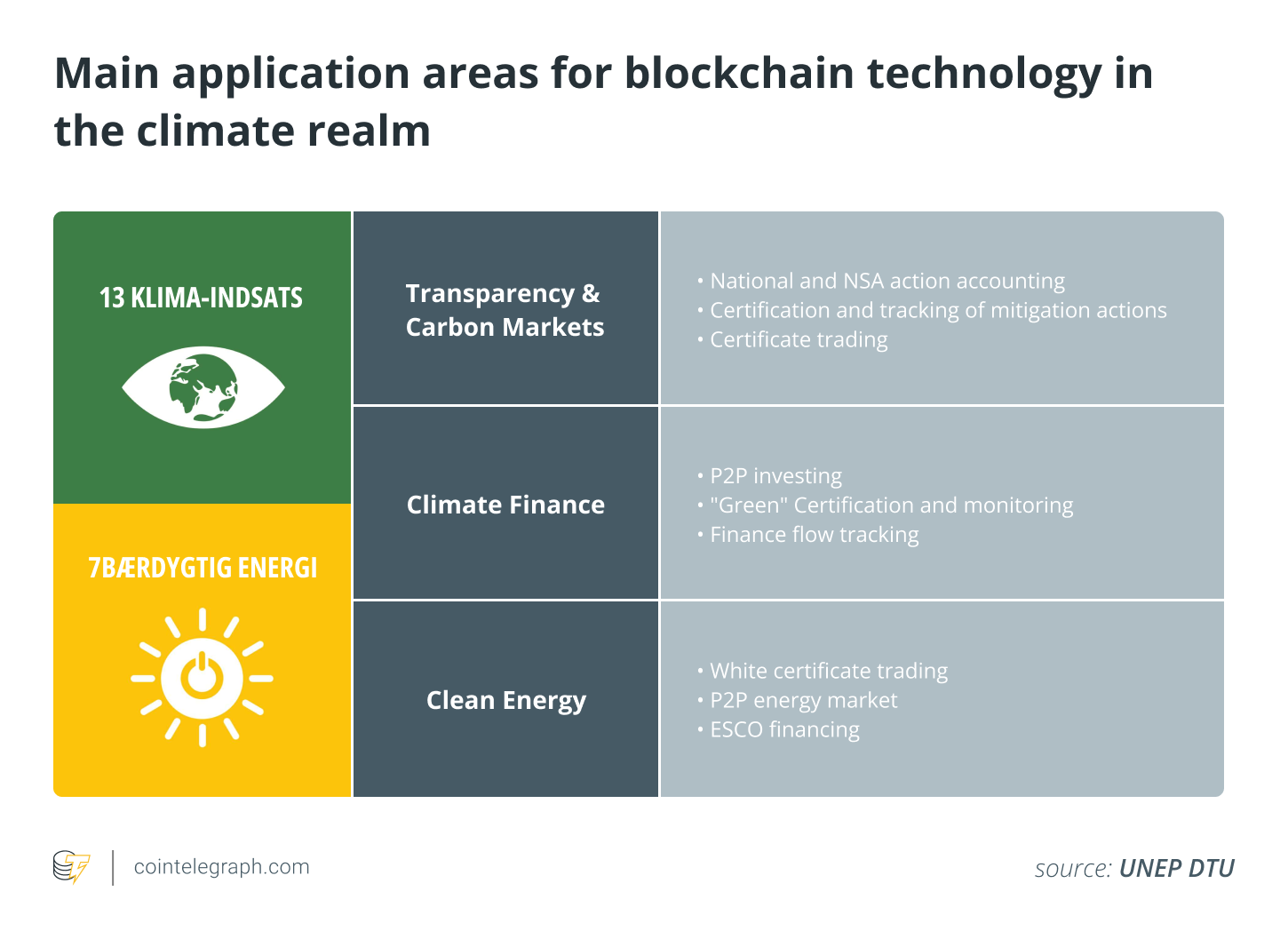Blockchain
As concerns about climate change and environmental sustainability continue to grow, many organizations are turning to innovative solutions to address these pressing issues. One such solution is blockchain technology, which has the potential to revolutionize sustainability efforts across industries.
On April 25, a white paper from the World Economic Forum (WEF) presented blockchain as a tool to combat climate change. The white paper highlighted the benefits of using blockchains in the climate action community. From improving market transparency to democratizing access to climate action, the WEF wrote about several benefits of using blockchain in sustainability efforts.
Digitization of the VCM is one of the key use cases for #blockchain innovations in climate action.
@wef’s paper “Blockchain for Scaling Climate Action” examines key examples and use cases, including the Climate Action Data Trust.
More: https://t.co/0JqAhUMTqy pic.twitter.com/Ltbux5PFrh
— Climate Action Data Trust (@CAD_Trust) Apr 27, 2023
To further explore blockchain’s sustainability potential, Cointelegraph reached out to industry executives to gather their knowledge on how blockchain can combat greenwashing, how it is currently being used in environmental efforts, and its long-term benefits. timeframe it provides for the world of climate action.
Solving the “greenwashing” problem
Greenwashing, a form of advertising that deceptively makes products appear more sustainable than they actually are, has been gaining prominence in recent years. In one survey, 68% of executives in the United States admitted that their company is guilty of greenwashing.
Outside, @xrbham is loud and clear on the samba drums
And highlighting @HSBC_UK #greenwashing with their greenwash bath pic.twitter.com/2740R1YCND
— Isabella Salkeld (@SalkeldIsabella) May 5, 2023
According to Daniela Barbosa, the executive director of the Hyperledger Foundation, the problem lies in verifying whether the companies claiming to be “green” are really adhering to their professed sustainability plans and goals.
The director believes that it is necessary to set up a system that tracks and keeps track of these matters. She emphasized that digital ledger technology (DLT) is the right tool for the job. Barbara explained:
“With the inherent transparency and immutability of DLT, companies and entire industries can record and document transactions such as carbon credits or sustainable procurement across their operations, giving sustainability claims new credibility.”
Barbosa believes that reliable record keeping systems will encourage companies to adopt sustainable practices, which will help them meet climate goals and build consumer confidence.
Related: Carbon market gets a much needed boost from blockchain technology — Web3 exec
Meanwhile, Gene Hoffman, the CEO and president of the Chia Network, also echoed Barbosa’s sentiments. According to Hoffman, the current infrastructure of carbon markets is restrictive and not conducive to innovation throughout the value chain. As a result, companies are limited in their ability to be transparent about their sustainability efforts across their organization.
The current use of Blockchain in sustainable initiatives
The days of companies pretending to be sustainable and environmentally friendly may soon end because of blockchain technology and DLTs. Currently, blockchain has made inroads into several initiatives by leading organizations around the world.
“There is a growing number of applications leveraging DLT and related technologies, including green finance, sustainability reporting, climate accounting and supply chain traceability,” Barbosa told Cointelegraph.
The executive highlighted efforts such as Genesis 2.0, a collaboration between the Bank for International Settlements (BIS) Innovation Hub, the Hong Kong Monetary Authority and the United Nations (UN) Climate Change Global Innovation Hub. The project included two prototypes for digitizing bonds with future carbon benefits embedded in their value. These were tracked, delivered and transferred using blockchain, smart contracts and other related technologies.

How blockchain can help in the fight against climate change. Source: UNEP DTU
Aside from this, Barbosa also highlighted how the government of British Columbia launched the Energy and Mines Digital Trust pilot, which builds verifiable sustainability reporting. The project uses blockchain to protect its data and information.
Additionally, Hoffman considers the Climate Action Data Trust (CADT) to be the most impactful climate initiative leveraging blockchain technology. The CADT aims to build confidence in carbon credit data among multilateral and governmental organizations.
While not led by Web3 natives, the initiative uses a publicly distributed ledger technology to address the issue of fostering internal collaboration among peers.
Furthermore, Hoffman also emphasized the importance of the Carbon Opportunities Fund, which builds on the foundation of the CADT. The project provides a reliable means of transparently obtaining carbon credits directly from project developers with end-to-end transparency. This approach improves efficiency and transparency in previously opaque climate markets, Hoffman said.
Long-term benefits of using blockchain in sustainability efforts
As blockchain gains acceptance in the climate action space, the industry could reap more of the long-term benefits, according to the executives. Victor Genin, the senior solution architect at BNB Chain, believes that one of the biggest benefits of using blockchain in the sustainability sector is ensuring compliance.
Genin explained that blockchains can be a means of tracking goods, services and resources throughout the supply chain. “This provides an opportunity to monitor compliance with environmental legislation and ensure that sustainable practices are followed throughout the life cycle of a product or service,” he added.
Aside from this, Genin stressed that there are other benefits, such as “increased transparency and accountability, traceability, energy efficiency, waste reduction and collaborative approaches.”
Despite all the benefits blockchain can offer, Hoffman believes it’s still not a “magic solution.” However, the executive believes that when designed and implemented responsibly, blockchain technology can serve as the necessary foundation or framework for achieving greater transparency, accountability and security in climate action efforts.
Magazine: US law enforcement agencies are on fire on crypto-related crime

